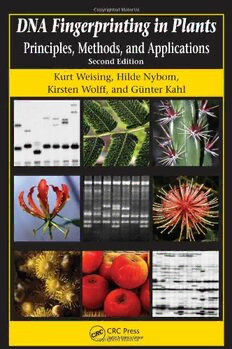Download DNA fingerprinting in plants: principles, methods, and applications PDF Free - Full Version
Download DNA fingerprinting in plants: principles, methods, and applications by Kurt Weising, Hilde Nybom, Kirsten Wolff, Günter Kahl in PDF format completely FREE. No registration required, no payment needed. Get instant access to this valuable resource on PDFdrive.to!
About DNA fingerprinting in plants: principles, methods, and applications
Given the explosive development of new molecular marker techniques over the last decade, newcomers and experts alike in the field of DNA fingerprinting will find an easy-to-follow guide to the multitude of techniques available in DNA Fingerprinting in Plants: Principles, Methods, and Applications, Second Edition. Along with step-by-step annotated protocols, the authors fully discuss the technical aspects and modifications of existing techniques, the influence of reaction components and conditions, and the analysis of the results. This second edition has been completely revised to address the exponential changes in the field since the first edition, focusing on PCR-based techniques but also including more sophisticated ones. The authors include numerous case studies to illustrate applications of the methods, more than 1600 references to the literature, and descriptions of reagent formulation, equipment, and computer programs used for evaluating molecular marker data. They compare the various methods, including the costs and benefits of each, helping readers determine which is best suited to a particular application. The well-rounded, cross-referenced, and unified nature of this book makes it intrinsically easier to follow than the edited, multi-authored books currently available. It is an absolute necessity on the lab bench of anyone involved in plant research, DNA profiling, and molecular markers.
Detailed Information
| Author: | Kurt Weising, Hilde Nybom, Kirsten Wolff, Günter Kahl |
|---|---|
| Publication Year: | 2005 |
| ISBN: | 9780849314889 |
| Pages: | 470 |
| Language: | English |
| File Size: | 7.083 |
| Format: | |
| Price: | FREE |
Safe & Secure Download - No registration required
Why Choose PDFdrive for Your Free DNA fingerprinting in plants: principles, methods, and applications Download?
- 100% Free: No hidden fees or subscriptions required for one book every day.
- No Registration: Immediate access is available without creating accounts for one book every day.
- Safe and Secure: Clean downloads without malware or viruses
- Multiple Formats: PDF, MOBI, Mpub,... optimized for all devices
- Educational Resource: Supporting knowledge sharing and learning
Frequently Asked Questions
Is it really free to download DNA fingerprinting in plants: principles, methods, and applications PDF?
Yes, on https://PDFdrive.to you can download DNA fingerprinting in plants: principles, methods, and applications by Kurt Weising, Hilde Nybom, Kirsten Wolff, Günter Kahl completely free. We don't require any payment, subscription, or registration to access this PDF file. For 3 books every day.
How can I read DNA fingerprinting in plants: principles, methods, and applications on my mobile device?
After downloading DNA fingerprinting in plants: principles, methods, and applications PDF, you can open it with any PDF reader app on your phone or tablet. We recommend using Adobe Acrobat Reader, Apple Books, or Google Play Books for the best reading experience.
Is this the full version of DNA fingerprinting in plants: principles, methods, and applications?
Yes, this is the complete PDF version of DNA fingerprinting in plants: principles, methods, and applications by Kurt Weising, Hilde Nybom, Kirsten Wolff, Günter Kahl. You will be able to read the entire content as in the printed version without missing any pages.
Is it legal to download DNA fingerprinting in plants: principles, methods, and applications PDF for free?
https://PDFdrive.to provides links to free educational resources available online. We do not store any files on our servers. Please be aware of copyright laws in your country before downloading.
The materials shared are intended for research, educational, and personal use in accordance with fair use principles.

